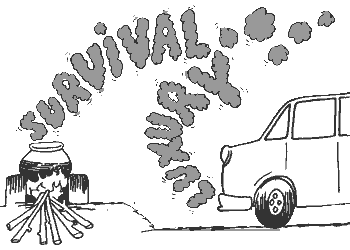|
 |
|
November 15, 2000
 Back to Basics by Anil Agarwal Back to Basics by Anil Agarwal
Global warming in an unequal world
When is one tonne of carbon
dioxide equal to another tonne of carbon dioxide?
Protecting the world's climate is humanity's biggest challenge. Nobody
knows how climate change will affect different regions. Europe, for example, could become
warmer. But if the melting Arctic turns off the Gulf Stream, it could also go into a
permanent freeze like the northern regions of Canada. One thing, however, is certain: it
is the poor who will suffer the most. Their poverty will make it impossible for them to
bear the cost of adaptation. More floods, more droughts and more storms will affect them
more than anyone else. Storms kill tens of thousands in India and Bangladesh. But when
they hit the US they do not kill even half a dozen though, of course, they destroy a lot
of property. Since global warming is mainly caused by the energy consumption of the rich
whereas the greatest sufferers will be the poor, it is vital that all rich nations and all
rich individuals work hard to prevent climate change - to the maximum extent possible as
some of it already looks inevitable now. The world will definitely become more feverish.
All that we can now do is to prevent it from catching high fever.
 Preventing climate change is not just an economic or an
environmental issue. It is above all a moral and ethical issue. And it is going to be the
biggest cooperative enterprise that the world has ever seen - one in which all big and
small, rich and poor, powerful and powerless will have to cooperate to achieve a global
objective for the global good. This can only happen if there is a sense of fairness in the
burden-sharing arrangements. Which raises some very difficult questions. For example, when
is one tonne of carbon dioxide equal to another tonne of carbon dioxide? Is one tonne of a
greenhouse gas produced by a New Yorker or a Londoner equal to a tonne of the same gas
produced by a peasant in Guatemala, Chad or Bangladesh? Preventing climate change is not just an economic or an
environmental issue. It is above all a moral and ethical issue. And it is going to be the
biggest cooperative enterprise that the world has ever seen - one in which all big and
small, rich and poor, powerful and powerless will have to cooperate to achieve a global
objective for the global good. This can only happen if there is a sense of fairness in the
burden-sharing arrangements. Which raises some very difficult questions. For example, when
is one tonne of carbon dioxide equal to another tonne of carbon dioxide? Is one tonne of a
greenhouse gas produced by a New Yorker or a Londoner equal to a tonne of the same gas
produced by a peasant in Guatemala, Chad or Bangladesh?
The simple, moral answer is 'no'. The first tonne is the result of
luxury. The second tonne of basic survival. Both of them go into the atmosphere. But one
needs to be controlled and the other needs to be supported. Maybe there is even a need to
create more atmospheric space to produce more tonnes of the latter type.In other words,
'luxury emissions' must go down to provide space for more 'survival emissions'. And all
this has to be done only because scientists tell us that the global bowl can only take a
certain number of tonnes without catching an explosive fever.
Unless we do a Western-style eco labelling programme for every tonne of
carbon dioxide or methane produced, the simple answer lies in ensuring that every human
being has the same number of tonnes to live with - to survive or to indulge. This is why
equity is such a central issue for all climate change negotiators. Nobody can get away
from it. Today or tomorrow.
So, please everyone, let's get back to the basics.
return to the index |
|


